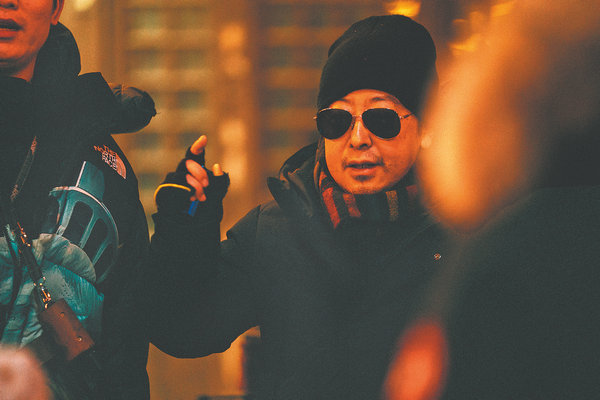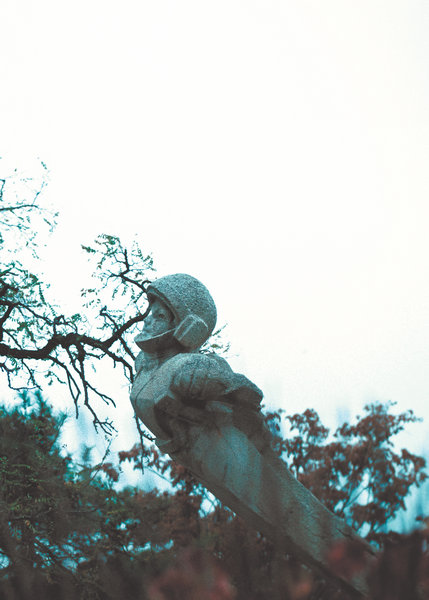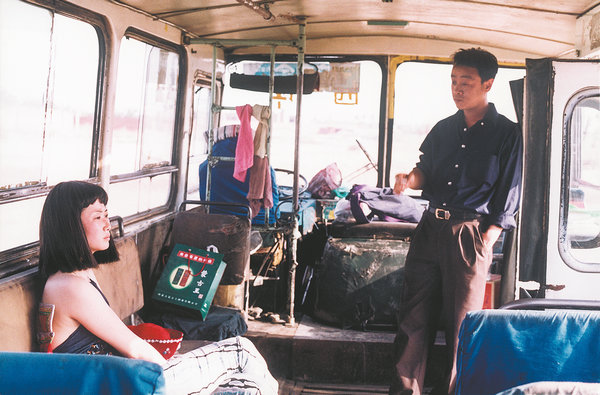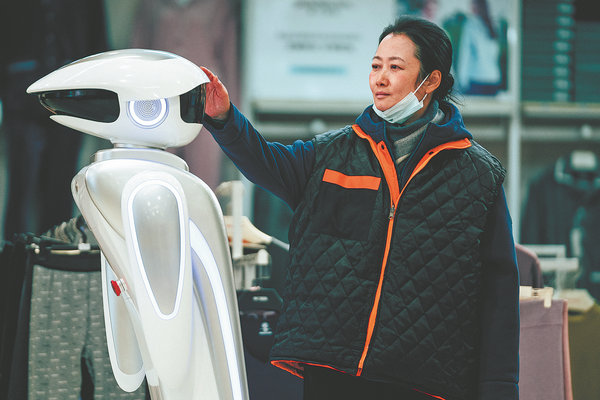Arthouse hero's 20-year opus gets release
Updated: 2024-11-28
Jia Zhangke's latest film reflects on changes of recent decades through carefully assembled moments of unscheduled life and emotion, Xu Fan reports.
Earlier this month, a simple, emotionally charged notification was posted on director Jia Zhangke's Sina Weibo social media account: "Tickets are now available. Thank you for the support!"
Perhaps only a limited number of individuals outside of the realm of die-hard cinema enthusiasts truly understood the heartfelt nature of this post.
Although he is one of the most recognized Chinese arthouse directors at international film festivals, merely 5.6 percent of all domestic screens showed Jia's latest film, Caught by the Tides, on its Friday debut. This screening percentage was much lower than that of a big-budget commercial blockbuster, which normally opens at around 30 percent, signaling the harsh situation for arthouse titles.
This film took the director and his team 22 years to shoot, and he planned to show it in theaters for just 22 days.
Despite the limited number of screenings, fans – currently nearly 19 million follow him on Sina Weibo – demonstrated their desire to support the 54-year-old auteur. One netizen responded to his post, saying, "I will watch the movie three times in the theater".
Jia's longevity has established him as an icon among the country's sixth-generation directors, and has shaped his values about life and society.

Jia directs for Caught by the Tides on set. [Photo provided to China Daily]
Rising to overseas fame at 27 with his debut Pickpocket in 1997, Jia established himself as a prolific filmmaker. His top accolades include the Golden Lion at the 63rd Venice International Film Festival for Still Life (2006) in Italy, Best Screenplay award at the 66th Cannes Film Festival for A Touch of Sin (2013) in France, and the Lifetime Achievement Award at the 63rd Locarno International Film Festival in Switzerland.
The native of Fenyang in Shanxi province draws heavily on his hometown, and many of his films also star his wife Zhao Tao, whose on-screen presence strikes a balance between serenity, beauty and resilience in the face of adversity. Additionally, his films often concentrate on examining life amid the flux of social change.
Filmed between 2001 and 2022, Caught by the Tides encapsulates all the director's distinctive and stylish cinematic traits.
Incorporating footage from previous films like Unknown Pleasures (2002) and Still Life, the film follows Qiaoqiao, portrayed by Zhao, as she navigates a tumultuous relationship with Bin, a young man she falls in love with in Datong, Shanxi province, but who leaves the city to pursue an ambitious future. It depicts the start of their romance in Datong, and Qiaoqiao's epic journey along the Yangtze River to find Bin, who departs to follow his career ambitions. Their story is interwoven with historical moments, from the displacements caused by the construction of the Three Gorges Dam to Beijing's successful bid for the Olympics.

A flying boy statue in a park and a street scene in Datong, Shanxi province. [Photo provided to China Daily]
In May, the film was nominated for the prestigious Palme d'Or at the 77th Cannes Film Festival, the sixth time Jia has been nominated in the festival's main competition section. Five months later, it secured the Best International Film award at the Sao Paulo International Film Festival, one of the oldest and most influential film events in South America.
"The film started with casual and occasional inspiration," Jia tells China Daily during a recent interview.
Recalling the project's inception in 2001, Jia says he conceived the idea of shooting the movie when digital cameras emerged on the domestic market as a more convenient and accessible tool. Originally titled Na Shuma Sheyingji de Ren (Man with a Digital Camera), the project was inspired by Man with a Movie Camera, a 1929 silent documentary film from the Soviet Union directed by Dziga Vertov.
"We were planning to take a digital camera, wander around different places, film unplanned encounters with people, and use this method to explore the first few years of a new century," Jia says.

Where the movie's plot commenced. [Photo provided to China Daily]
Jia was born in 1970 and living his formative years during China's dynamic period of the reform and opening-up. To many people like him, the beginning of the 21st century was a time filled with beauty and hope. The year 2000 marked a milestone in China's long-standing goal of the Four Modernizations – agriculture, industry, defense, science and technology.
Recalling how he grew up learning about these goals, Jia says that he and his peers were once filled with expectations for the new millennium. They were even more excited to witness the unprecedented transition from traditional society to the internet era as the new century began.
For the director, the digital camera also allowed him to shake off the limitations of the film industry, which traditionally requires a big crew and scheduled collaboration, to create in an improvisational way.
"I'm particularly fascinated by the free form of filmmaking, as it can result in vibrant movies, full of life," Jia says.
After intermittently filming for nearly 20 years, his team had amassed over 1,000 hours of footage but had yet to decide on a conclusion. This indecision persisted until the outbreak of the COVID-19 pandemic, which abruptly halted the director's busy life. He had previously spent about a third of the year traveling overseas to international events, but now his routine underwent a significant change and he began to commute between office and home every day, like many others in Beijing.

Caught by the Tides by director Jia Zhangke, featuring Qiaoqiao, the protagonist played by Zhao Tao, seen eating a takeaway on a ship. [Photo provided to China Daily]
The crisis provided him with an unexpected pause to delve deeper into observing the era of the internet, whose development was not impeded by the pandemic. In fact, Jia says that the internet thrived.
In 2022, he was invited to host Do Not Answer, a sci-fi talk show that facilitates engaging discussions about the future with well-known figures, including China's first Hugo Award winner in 2015, sci-fi writer Liu Cixin. The topics range widely, from interstellar travel to artificial intelligence.
Stimulated by the program, Jia began thinking about AI more deeply. He believes it may help eliminate language barriers between countries in the future, but may also weaken the emotional bonds between people.
"In the era of letter writing, when you missed a friend or a loved one, composing a letter took two or three hours. By the time you sent it from the post office and received a reply, it could take up to half a month. During that period, what developed was a shared experience of longing and concern. However, instant video chat diminishes the intensity of such emotions," he explains.

In her youth, Qiaoqiao, the protagonist played by Zhao Tao, has an unpleasant moment with Bin, her romantic interest. [Photo provided to China Daily]
As the film approaches its conclusion, the melancholic protagonist, having eaten a steamed bun all alone, encounters an AI robot circling the supermarket where she works. The robot's greetings and comforting quotes about love and laughter from Mother Teresa and Mark Twain cause her demeanor to soften, and she smiles.
For Jia, this scene is a metaphor. "The supermarket symbolizes our era. While there is material abundance, this also results in modern symptoms, like feelings of loneliness," he explains.
Despite the setbacks, Jia still appreciates the resilience of ordinary people in society, aiming to show their everyday emotions – pleasure, anger, sorrow and joy – and seeks to convey these in his films.
Shi Futian contributed to the story.
Contact the writer at xufan@chinadaily.com.cn

Turning middle-aged, Qiaoqiao encounters a robot at a supermarket. [Photo provided to China Daily]



